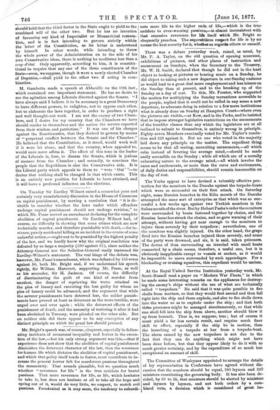There was a debate yesterday week, raised, as usual, by
Mr. P. A. Taylor, on the old question of opening museums, exhibitions of pictures, and other places of instruction and amusement on Sundays, when the Secretary to the Treasury, Mr. W. H. Smith, declared that though he did not in the least object to looking at pictures or hearing music on a Sunday, he- did object to taking such a new departure in our Sunday customs as would lead to a great deal more employment and lees leisure On the Sunday than at present, and to the breaking up of the Sunday as a day of rest. To this, Mr. Forster, who supported the motion for multiplying the Sunday recreations accessible to the people, replied that it could not be called in any sense a new departure, to advocate doing in relation to a few more institutions what is already done on Sunday at Hampton Court—where even the pictures are visible,—at Kew, and in the Parks, and he insisted that to impose stronger legislative restrictions on the amusements- of the humbler classes than any which the legislators are at all inclined to submit to themselves, is entirely wrong in principle. Eighty-seven Members eventually voted for Mr. Taylor's resolu- tion and 229 against it. But no one who voted in the majority laid down any principle on the matter. The expedient thing seems to be that all resting, unexciting amusementa,—all which calm instead of fevering the average mind,—should be made easily accessible on the Sunday ; while all which are of a morally exhausting nature to the average mind,—all which involve the- cares and excitements, or more than the cares and excitements, of daily duties and responsibilities, should remain inaccessible OD the day of rest.


































 Previous page
Previous page